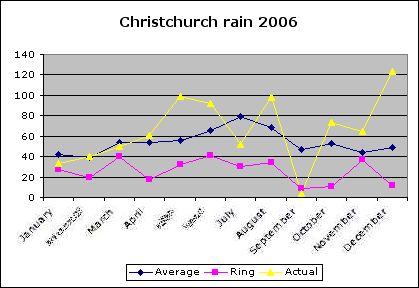And so, rather later than intended, we come to the end of my Ring audit. With NIWA's figures for December 2006 available, I can update my figures and finish my assessment. The final spreadsheet and all the graphs are available here. It was a "normal" month for Ken - a 50% hit rate on rainfall and sunshine in the four main centres. A forecast of the long term averages for each centre would have done better - you'd have scored 75%. If Ken's method had any merit, you might expect him to get something right - the general flow of the weather, perhaps, or the overall season. He doesn't.

Take a look at the chart for Christchurch's rainfall for 2006. Throughout the year, Ken's been forecasting dry weather and warning of drought. In his notes for December he refers to "the prolonged exra-dry conditions in the east of the South Island" and warns that "the dry conditions in Canterbury and Otago are set to continue until May 2007". Christchurch had a wet year. Rainfall was 120% of normal, while Ken was forecasting 50%. In fact the last three months of the year were notably wet. At the time of writing, the region is an unseasonal emerald green. My neighbours are finding it hard to get enough dry days to get hay making under way, and I'm spending far too much time on my mower. In other words, Ken's forecast is "not even wrong".
If you want to see how he did in the other centres, download my Excel spreadsheet and have a look. His "best" rainfall performance is Dunedin, which did have a dry year, but in Auckland and Wellington he didn't call a single season right. This is hardly surprising when you analyse his forecasting method. He takes the weather maps from 18 years and 10 days ago, and uses them to predict the daily weather around the country. This doesn't work. It doesn't even get close to predicting the "trends" he waffles on about, and as my little audit proves, has no merit for rainfall and sunshine forecasting. On to that "foundation" he layers stuff based on the moon's movements around the sky - which he admits is "very much astrological". This has the obvious merit of allowing him to have two goes at a forecast. He can pick and choose which ones to trumpet after the event - something he's become very skilled at.
Unfortunately, the people who buy his almanac and use it to plan their weather-related activities - the farmers, mariners and events organisers he says are devoted to his services - don't have that luxury. They need to know in advance, and Ken can't help there. So why does his book sell? How can he get away with being wrong so often, and yet still be taken seriously?
The answer is that he really believes he's right. He has so much personal mana invested in his "moon method" that he can't allow himself to see that it doesn't work. Ring's deception is self-deception, his belief in himself and his method total. He can't allow himself to admit that his method doesn't - can't - work. And with his combative personality and communication skills, he's good media fodder. The MetService forecasters are the ones conning the public, Ken Ring the lone voice in the wilderness crying sanity. It makes for good copy, for captivating soundbites.
The mystery is not why Ken is able to promote himself despite the evidence that his method is useless, it's why people buy his books. I suspect that his audience likes the idea that they are privy to an answer that the rest of the world is missing. Some people use the phases of the moon to determine their gardening schedule. It's natural for them to assume that the Ring method works. There's a parallel with dowsing for water: completely rational farmers will sometimes hire a man with a piece of bent wire to determine where they should sink a well. The evidence for dowsing is about as strong as for Ring's moon madness. Sometimes people believe six impossible things before breakfast, and then buy a Ring almanac before lunch.
My Ringworld analysis is over, but the Ringworld category will remain open for discussion of Ken's forecasts and his occasional forays into other matters. His dismissal of global warming (here) is a classic. I may return to it at a later date.
.jpg)


